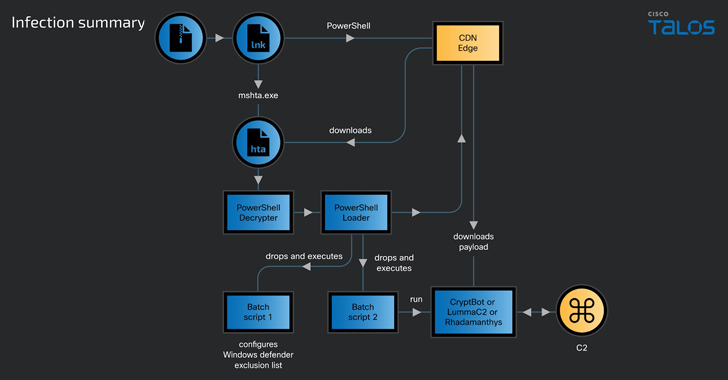Author: nlqip
Apr 24, 2024NewsroomMalware / Data Security A new ongoing malware campaign has been observed distributing three different stealers, such as CryptBot, LummaC2, and Rhadamanthys hosted on Content Delivery Network (CDN) cache domains since at least February 2024. Cisco Talos has attributed the activity with moderate confidence to a threat actor tracked as CoralRaider, a suspected…
Read MoreHi. I’m Mike Convertino, CISO of F5 Networks, and I want to welcome you to an experiment we’re conducting here at F5. We’ve laid the foundation of this CISO to CISO portal on an idea that has traditionally been somewhat controversial in the security community: openness. As you may or may not know, I spent…
Read MoreAutomation Risks There are a number of container and automation frameworks out there that seek to make scale as effortless as the click of a mouse. Some of them are rising quickly due to the excitement over containers, like Mesos and Kubernetes. Others have been around for a while—think Puppet, Chef, VMware, Cisco, and OpenStack.…
Read MoreIn just four short years, a healthy dose of paranoia about individual privacy as well as emerging support for encryption by browsers, social media sites, webmail, and SaaS applications have pushed encryption estimates from almost non-existent (in the low single digits before 2013) to just over 50% by the end of 2016. That’s quite a…
Read MoreCyber security has evolved in ways we never could have imagined. We have more specialized and powerful tools and services today than ever before, security budgets are slowly inching upward, and there are even glimmers of support from management. Yet, with the pace of technological change, the growing “professionalization” of cyber crime, and ever…
Read MoreWhen someone from the IT group gets promoted into security management, a common first lesson is that “geek culture” is ineffective in the boardroom. Just watch one episode of The Big Bang Theory and you’ll recognize the classic nerd character types. Those who behave in that manner tend to get marginalized by executives. We’ve all probably seen…
Read MoreFigure 2: Top domains in a Shodan search for CVE-2014-0160 on January 22, 2017 That’s disconcerting because there is a tendency to “fire and forget” in the public cloud, and concerns over understanding the shared responsibility model of public cloud have been previously voiced. This remains my favorite quote, from AWS head of global…
Read MoreAn important part of an information security professional’s job is communicating risk. Clear, concise communication that leadership can understand and act upon is the heart of a risk management system. The challenge is that many IT risk scenarios appear abstract, vague, or irrelevant to colleagues working outside of InfoSec. Consider a common interaction that might…
Read MoreCISOs have a lot on their plates. In addition to overseeing security operations and projects, they also lead and advise their organizations regarding risk. In short, a CISO must grapple with numerous obligations of varying size and complexity. The obvious obligations, such as compliance with regulations and laws, can take up a significant part of…
Read MoreThe essence of this attack is van Beek’s Microsoft Exchange Autodiscover vulnerability. In a September 2016 interview with The Register, van Beek said, “I recently discovered that most, if not all, Microsoft Exchange clients (eg, Outlook, iPhone mail app, Android mail app, Blackberry Mail App) are more than happy to provide a user’s password in plain…
Read MoreRecent Posts
- CISA Releases the Cybersecurity Performance Goals Adoption Report | CISA
- Multiple vulnerabilities in SonicWall SonicOS could allow a remote attacker to bypass authentication.
- Dell Sales Leader, Former Channel Chief John Byrne Steps Down
- The Dangers of DNS Hijacking
- CES 2025: 15 PC Chips Announced By Intel, Nvidia, AMD And Qualcomm


